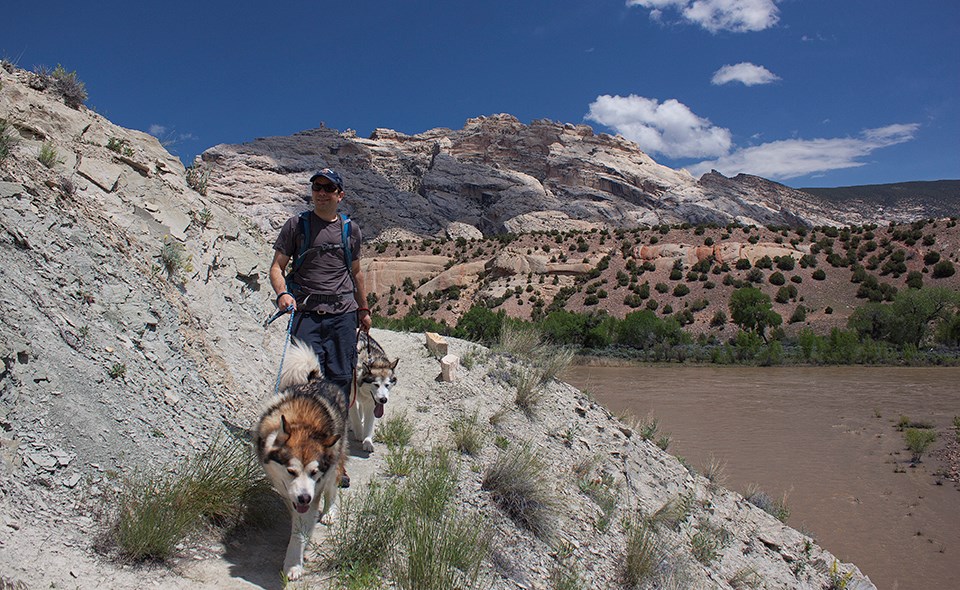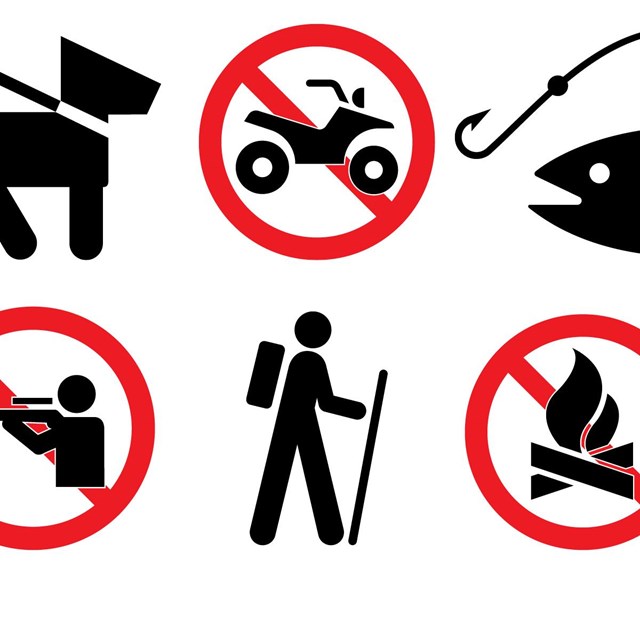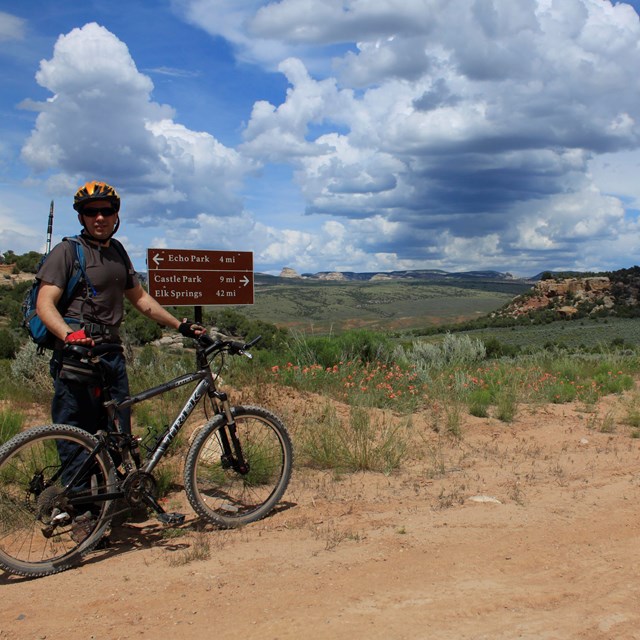
NPS 
Many people consider their pets members of the family and travel with them on vacation. Unfortunately, pets and wild areas can sometimes result in a dangerous mix. Pets have been attacked by wildlife, harassed and killed wildlife, bitten or disturbed other visitors, and fought with other pets. Pets are welcome at Dinosaur National Monument, but as a unit in the National Park Service there are regulations regarding pets that are enforced within the monument. Keep Your Pet LeashedAll pets must be on a 6-foot leash or shorter or physically restrained at all times. Pets may not be left unattended or tied to an object. Where Pets Can Go in Dinosaur National MonumentYou may walk leashed pets within 100 feet of developed areas such as roads, parking lots, campgrounds, day-use areas, and river launches. Pets are allowed on the following trails along the Harpers Corner Road (Colorado side): Plug Hat Butte and other trails at the Plug Hat Picnic Area, Canyon Overlook, Echo Park Overlook, and Iron Springs Bench Overlook. In Utah, leashed pets are allowed on the short trail to Swelter Shelter Petroglyphs and the River Trail. Where Pets Cannot Go in Dinosaur National MonumentPets are not allowed on the shuttle or in any buildings such as visitor centers or the Dinosaur Quarry Exhibit Hall. Please make your visit to these buildings brief or take turns with family members to stay outside with your pet. If visiting the Dinosaur Quarry in summer, tell a ranger you are traveling with a pet and you can drive to the Quarry in your own vehicle. Dispose of Pet WasteAll solid pet waste must be promptly collected and thrown away as trash. Garbage cans are located near the visitor centers, at day-use areas and in campgrounds. Pet SafetyNever leave pets in an enclosed vehicle! Do not leave pets inside a closed vehicle for even short periods of time, especially in the summer. On even a mildly warm day, the temperature in a parked car can rise to 120°f or more in a matter of minutes - even with the car windows partially open. Pets can quickly overheat and die. Dinosaur National Monument weather is semi-arid with hot summers. There is little to no shade. Hike with your pet in the early morning or near sunset. Carry plenty of water for you and your pet. Dinosaur National Monument is home to a variety of wildlife that can be dangerous to you and your pet such as mountain lions and bears. Even a female deer will act aggressively to protect her young. Always keep your pet on a leash. Many of the wildlife in Dinosaur National Monument carry diseases or parasites such as fleas and can transmit diseases such as rabies, tularemia and plague. Keep your pet away from wildlife and dead animals. Need a Kennel?Nearby local communities may have kennels for your pets. Contact local organizations to locate a kennel.
Service AnimalsHow "Service Animal" Is DefinedService animals are defined as dogs that are individually trained to do work or perform tasks for people with disabilities. Examples of such work or tasks include guiding people who are blind, alerting people who are deaf, pulling a wheelchair, alerting and protecting a person who is having a seizure, reminding a person with mental illness to take prescribed medications, calming a person with Post Traumatic Stress Disorder (PTSD) during an anxiety attack, or performing other duties. Service animals are working animals, not pets. The work or task a dog has been trained to provide must be directly related to the person's disability. Dogs whose sole function is to provide comfort or emotional support do not qualify as service animals under the Americans with Disability Act (ADA). This definition does not affect or limit the broader definition of "assistance animal" under the Fair Housing Act or the broader definition of "service animal" under the Air Carrier Access Act. Some State and local laws also define service animal more broadly than the ADA does. Information about such laws can be obtained from the State attorney general's office. Where Service Animals Are AllowedUnder the ADA, State and local governments, businesses, and nonprofit organizations that serve the public generally must allow service animals to accompany people with disabilities in all areas of the facility where the public is normally allowed to go. Service Animals Must Be Under ControlUnder the ADA, service animals must be harnessed, leashed, or tethered, unless these devices interfere with the service animal's work or the individual's disability prevents using these devices. In that case, the individual must maintain control of the animal through voice, signal, or other effective controls. Inquiries, Exclusions, Charges, and Other Specific Rules Related to Service Animals
More Information
| |||||
Last updated: July 19, 2024



